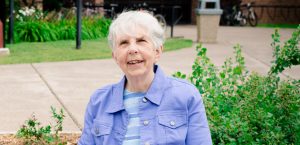
Read the full article on the College of Engineering news blog.
Martha Sloan shares her knowledge on Husky Bites, a free, interactive Zoom webinar this Monday, February 28 at 6 pm ET. Learn something new in just 30 minutes (or so), with time after for Q&A! Get the full scoop and register at mtu.edu/huskybites.
What are you doing for supper this Monday night 2/28 at 6 ET? Grab a bite with Dean Janet Callahan and Michigan Tech Professor Emerita Martha Sloan, whose impact on people on and off the Michigan Tech campus has been monumental. During Husky Bites, Prof. Sloan will share stories from an earlier time at Michigan Tech, when women in engineering were few and far between.
Joining in during Husky Bites will be Dan Fuhrmann, the Dave House Professor of Computer Engineering and chair of the Department of Applied Computing at Michigan Tech.
“Martha was a faculty member in the Department of Electrical and Computer Engineering when I first came to Michigan Tech in 2008 to take the position of ECE department chair,” notes Fuhrmann. “Shortly thereafter I appointed her as associate chair, a position she held until 2012, just before her retirement after 43 years of service at Michigan Tech.”
A pioneer in many aspects of her career, Sloan is also a legendary mentor who always has time to help anyone who asks. She was the first woman to be hired as a faculty member in the Michigan Tech ECE department, and later became the first woman to serve as chair of the department. Sloan was also the first woman to become the president of the Institute of Electrical and Electronics Engineers (IEEE), the largest professional organization in the world.
Sloan earned all of her three degrees–a BS in Electrical Engineering with great distinction, an MS in Electrical Engineering, and a PhD in Education–at Stanford University. She earned her BSEE in 1961, Phi Beta Kappa and with great distinction, as the only woman among approximately 600 engineering graduates.
In the 1960s she worked at the Palo Alto Research Laboratory of the Lockheed Missiles and Space Company. She began a PhD program at the Massachusetts Institute of Technology but, feeling isolated there and pregnant with her first child, she did not complete the program. Instead, she moved to Germany, where she taught for two years at the Frankfurt International School.
“My German was not good enough to be able to work as an engineer, so I taught 7th and 8th grade science, and picked up a MS in secondary education–all in German–while I was there, too,” Sloan recalls.
In 1969 Sloan moved to Houghton, Michigan with her husband, Norman Sloan, who had accepted a position as a professor of ornithology, forestry, and wildlife management at Michigan Tech.
“I found myself looking for a job once again and thought I’d go back to teaching,” she says. “At the time there was no need for math or science teachers in the Houghton area. On sheer impulse, I wandered into Michigan Tech’s EE department, just to see if they needed a teacher, since I had a master’s degree. I was hired on the spot to teach Circuits.”
Needing a doctorate for her new job at Michigan Tech, Sloan returned to Stanford to earn a PhD in Education in 1973. Her thesis was on the COSINE Committee, an NSF-funded project to include computer engineering as part of the electrical engineering curriculum.
Sloan became active in engineering professional societies, serving as treasurer, vice president, and president of the IEEE Computer Society, IEEE, and AAES. She served for nine years on the board of trustees of SWE, the Society of Women Engineers.
Over the years Sloan has been honored with the Frederick Emmons Terman Award by the American Society for Engineering Education (ASEE), the IEEE Centennial Medal, and the IEEE Richard E. Merwin Distinguished Service Award. She received an honorary doctorate from Concordia University, was elected fellow of the Association for Computing Machinery, given the Distinguished Engineering Educator Award of the Society of Women Engineers (SWE), and earned the Michigan Tech Distinguished Service Award, too. (Read Professor Sloan’s complete bio on Wikipedia.)
In 1991 Sloan became a fellow of the IEEE “for contributions to engineering education, leadership in the development of computer engineering education as a discipline, and leadership in extending engineering education to women.”